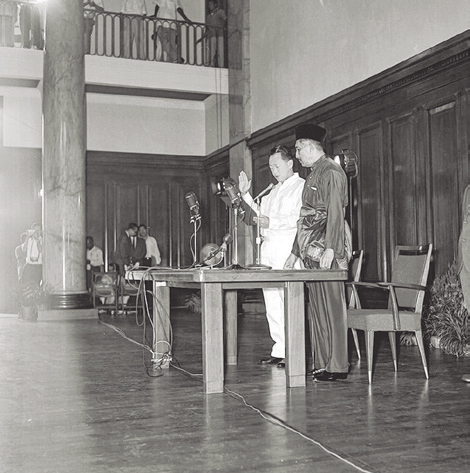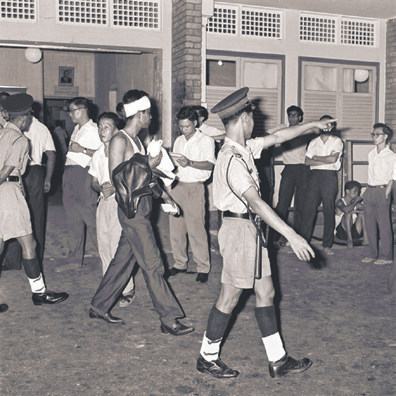LIVING HISTORY
A force for good
SOUL SEARCHING TIMES: By Minister for Foreign Affairs and Law K. Shanmugam
Sign up now: Get ST's newsletters delivered to your inbox
2015. THE STRAITS TIMES turns 170, and Singapore turns 50. It is a year to celebrate, reflect, and then to look ahead.
The Straits Times has been an integral part of Singapore for 170 years. It has become an important and vital institution in our society, a force for much good. But to remain relevant, all institutions must adapt along with societal change.
So even as it celebrates its 170th anniversary, ST is confronting a fast-changing landscape.
ST, like all traditional media outlets, has to confront the changing role of the media in society. As the leading national broadsheet, the role that ST defines for itself forms an important benchmark for the role of the media in Singapore.
One question which frequently arises is: should ST adopt the ideology of the media as Fourth Estate: ferreting out the truth, holding governments to account and championing the poor against the rich.
A corollary to this ideology is that the media should not be subjected to rules and regulations, so as ensure that those in power cannot withhold information and stifle criticism.
But there are some realities which this ideology must confront:
• The reality of press barons who control substantial sections of the media, and use this influence to compel governments to pander to them and their interests. The media then becomes the handmaiden of the rich.
• The reality that the media, not infrequently, has to have an eye on its revenue, and hence the interest of its advertisers.
• The reality that the media holds tremendous power to discredit legitimately chosen governments, derail policies which may be good for society as a whole, and colour people's perceptions.
These realities are quite at odds with an ideology built on the belief that the media will always put forward different views objectively, without bending to pressure, financial or otherwise. These realities reflect how the media, left entirely to its own devices, might not always choose to act in the best interest of society as a whole.
Having faith in the media as Fourth Estate also allows it to become a powerful political actor, despite being unelected. It can and often does make or break governments. It can and often does decide which party wins elections. It can and often does make politicians of all stripes fawn on media barons.
We see this in many other countries, and this is not healthy for democracy.
In Singapore, we believe that the media best serves society by reporting honestly, accurately and truthfully on what is happening in the political arena. In Singapore, we have thus employed a mix of approaches:
• Rules which prevent any single person from having majority control of the media (to prevent the rise of media barons);
• Laws which circumscribe, among other things, gratuitous insulting of race and religion; and
• Laws, conventions and mores which constrain the media from being a political actor and which encourage it to be neutral, fair and objective in reporting.
Over time, these have formed the boundaries for media operating in Singapore. We want our media, including ST, to be neutral prisms, reflecting accurately the viewpoints across the political spectrum. They must let the people decide for themselves, based on the facts put forward, honestly and objectively.
In this way, the people benefit. They get to hear the viewpoints across the political spectrum without distortions. It makes for a freer, more honest debate.
MEDIA AND SOCIAL HARMONY
This approach is not without its detractors. They see these constraints as stifling free speech, rather than a response to the realities of media as a business.
This is another ideological stance, one which states that there should be minimal constraints on information and speech. This ideology states that complete freedom of information and ideas results in greater discussion and enlightenment.
This ideology is often imbued with universality: that all societies must adopt this same approach, because it is equally good for all.
On Jan 7 this year, two gunmen forced their way into the office of the French magazine Charlie Hebdo in Paris. They killed 12 people in cold blood, calling out the names of their victims as they shot them. The gunmen believed that they were the warriors of God, and were avenging insults to their religion.
Charlie Hebdo is a product of this ideology of complete freedom of information and speech. Charlie Hebdo's creed was irreverence.
It had portrayed Jesus, the Pope and Prophet Muhammad in sexual cartoons, and published images of masturbating Catholic nuns on their pages. Nothing was sacred nor out of bounds.
Having faith in the media as Fourth Estate also allows the media to become a powerful political actor, despite being unelected. It can and often does make or break governments. It can and often does decide which party wins elections. It can and often does make politicians of all stripes fawn on media barons. We see this in many other countries, and this is not healthy for democracy.
1960
A PAPER FOR TWO
The newspaper is printed in both Singapore and Kuala Lumpur, with the company using its own aircraft to exchange printing material between its two news centres, a move which boosts efciency and nancial savings.

1963
THE FEDERATION
The Federation of Malaysia, which includes Singapore, is born on Sept 16. The PAP's General Election victory is seen by The Straits Times as an approval of the merger, which the paper supports. It also acknowledges the PAP's ability to deal with the communists.

1964
THE RIOTS
The outbreak of Chinese-Malay riots in July and September worsens existing tensions. Journalists seek to downplay the trouble, and The Straits Times encourages moderation


